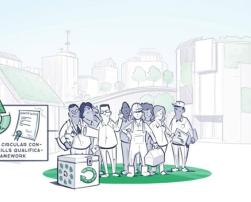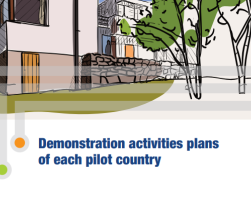
Technical guidance for thermal bypass risks
This guide contains peer-reviewed papers to make the proper reference which represents the base for the practical implications for policymakers, certifiers, designers and constructors. The guide discusses the importance of the reliability of performance gaps from the design phase to the final building.
Editorial team

Research & Innovation to support the Commission´s Action Plan to digitalise the energy system
Boosting the digitalisation in the energy sector to integrate energy systems as indicated the latest European Action Plan can be achieved if research and innovation are implemented. Specifically, they are key to accelerate the development, implementation and upscaling of digital solutions in energy supply and demand.
Editorial team

Commission´s Action Plan to digitalise the energy sector
The European Commission has developed an Action Plan to digitalise the energy sector, and thus to improve the energy efficiency and renewable integration. It has been highlighted how the green and digital transition must go hand in hand, hence more innovative digital solutions are needed.
Editorial team

Applied circular construction skills qualification framework
The task-base qualification framework, developed by Bus-GoCircular project, aims at developing circular skills in construction. The framework will be used by the project to develop train-the-trainer and mentoring programmes for circular construction skills in Europe, and learning outcomes will be added to the BUILD UP Skills Advisor app.
Editorial team

C40 research reveals the cost of fossil gas in cities: clean energy is cheaper, creates more jobs and causes less pollution
Research coming fom C40 cities has found and proved that gas use contributes almost as much as coal power plants to premature deaths in 2020 and that clean energy is cheaper, creates more jobs and causes less pollution. The C40 report in fact gives recommendations and positive examples to cities which would like to undertake this clean energy transition.
Editorial team

Green bonds support the energy-efficient transition of housing in Sweden
Östersund in Sweden has set up a framework which would lead it to be climate neutral by 2030. In order to reach this target, the city has developed a green bond scheme in renewable energy, mobility and energy-efficient housing. The city must therefore increase the use of renewable energy and reduce energy consumption by 30% compared to 2010.
Editorial team

Reducing the lifecycle carbon footprint of buildings while fostering innovation in renovation
The BPIE report "Whole life carbon and industrial renovation: realising the opportunities to reduce the lifecycle carbon footprint of buildings" focuses on opportunities to leverage both the whole-life carbon impact of renovation and industrial prefabricated renovation solutions and provides recommendations for policymakers aiming to create an optimal policy framework to reduce emissions from buildings while fostering innovation in the renovation sector.
Editorial team
Boosting the Renovation Wave with Modular Industrialized Renovation Kits: mapping challenges, barriers and solution strategies
With an insufficient rate of existing building renovation, there is need to step up the pace of building renovation to achieve European Union (EU) climate goals for 2050. Industrialization and related technological innovations, especially Zero Energy Renovation Kits, are at the core of boosting the Renovation Wave. This positioning paper reports on the results of a workshop at the Sustainable Places 2021 Conference by six Horizon 2020 projects, assessing the challenges and barriers to develop, adopt and/or implement Zero Energy Renovation Kits.
Gloria Oddo

The role of circularity and low-carbon materials in building projects
Why is it important the way we build? How is the construction and building industry going to be transformed in order to met the energy transition targets? According to Iulia Potor, from Partel, by integrating Life Cycle assessment for construction projects, professionals can optimise whole life carbon, cost, and circularity of design.
Editorial team

ePANACEA Demonstration activities plans of each pilot country
This document contains a detailed description about the ePANACEA testing and demonstration activities concerning the case studies of each pilot country. It includes a description of the process and the development of the activity schedules and a detailed explanation of the milestones including descriptions of selected case studies, activity schedules, milestones and expected outcomes.
Angeliki Kaplani